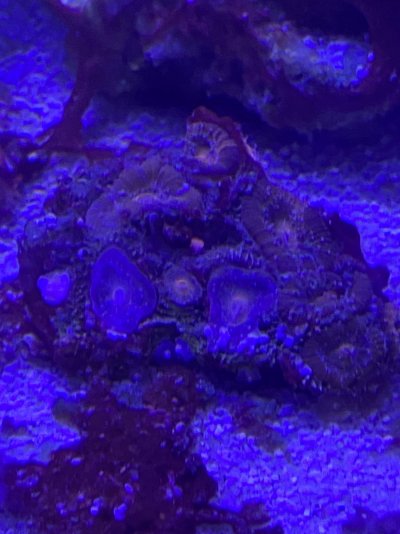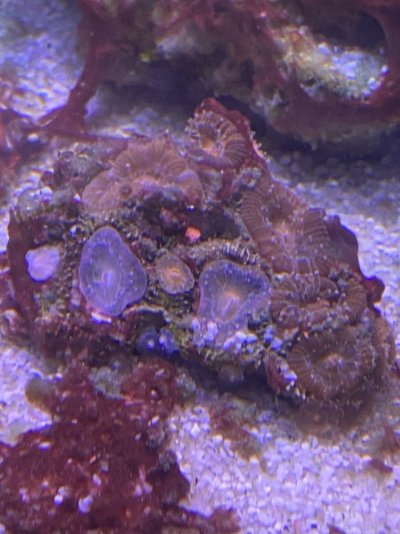not all "slow changes to water chemistry" are created equallyRapid changes outside would likely cause the coral to need to rapidly adjust its internal state vs slow dripping which is a gentle transition. Again, following the logic that the rapid changes are better, that would thus be saying that pretty much all dosing companies, all coral companies, and 99% of people on here are wrong that corals require slow changes to water chemistry
Navigation
Install the app
How to install the app on iOS
Follow along with the video below to see how to install our site as a web app on your home screen.
Note: This feature may not be available in some browsers.
More options
You are using an out of date browser. It may not display this or other websites correctly.
You should upgrade or use an alternative browser.
You should upgrade or use an alternative browser.
IS MY CORAL OK ??
- Thread starter Emma_fish
- Start date
- Tagged users None
I don’t think you understand how diffusion works. Unless you’re doing an acclimation over several days, it’s literally pointless. Even over 12 hours a coral is not going to completely diffuse all of the water in its tissue to reach an equilibrium with the water it’s being put into. It takes a day or two for a coral to completely diffuse all of the water in its tissue to reach equilibrium with the surrounding water, doing an hour or two drip acclimation, with a retracted coral that is not actively respirating isn’t helping it to acclimate, it is just prolonging the time that it’s unable to respirate and acclimate itself. A two hour acclimation is not a ‘slow transition’, it’s just two more hours the coral can’t respirate. This idea that ‘if we’re not drip acclimating corals then there’s no logic in making changes slowly’ is again completely missing the point. A coral is going to go through stress in being transported and changing environments, and it takes up to a couple days for a coral to fully acclimate and reach equilibrium with the new tank water, doing a two hour drip acclimation does not lessen that change or make it easier for the coral to adapt to it, it may actually make the acclimation more stressful. The only way a drip acclimation would be helpful is if you did it very slowly over the course of 2-3 days, and even that wouldn’t be stress free.Rapid changes outside would likely cause the coral to need to rapidly adjust its internal state vs slow dripping which is a gentle transition. Again, following the logic that the rapid changes are better, that would thus be saying that pretty much all dosing companies, all coral companies, and 99% of people on here are wrong that corals require slow changes to water chemistry
I mean, you can drip acclimate if you want to, in most cases it’s probably not going to do any long term damage, but there is no biological reason to do it, it doesn’t serve any purpose. It’s something that you should do for fish and inverts (especially clams) or anything that uses hemoglobin or similar to respirate. Fish do not depend on diffusion to respirate, so changes in salinity can be deadly (osmosis can cause hypo or hypernatremia, depending on whether the water is more or less salty). Again, acclimate your corals however you want, but all drip acclimation does is make you feel better, it does nothing beneficial for your corals.
And with that, I’m not going to divert any more attention away from this thread, I just wanted to give some helpful advice, not debate or defend settled science.
I don’t think you understand how diffusion works. Unless you’re doing an acclimation over several days, it’s literally pointless. Even over 12 hours a coral is not going to completely diffuse all of the water in its tissue to reach an equilibrium with the water it’s being put into. It takes a day or two for a coral to completely diffuse all of the water in its tissue to reach equilibrium with the surrounding water, doing an hour or two drip acclimation, with a retracted coral that is not actively respirating isn’t helping it to acclimate, it is just prolonging the time that it’s unable to respirate and acclimate itself. A two hour acclimation is not a ‘slow transition’, it’s just two more hours the coral can’t respirate. This idea that ‘if we’re not drip acclimating corals then there’s no logic in making changes slowly’ is again completely missing the point. A coral is going to go through stress in being transported and changing environments, and it takes up to a couple days for a coral to fully acclimate and reach equilibrium with the new tank water, doing a two hour drip acclimation does not lessen that change or make it easier for the coral to adapt to it, it may actually make the acclimation more stressful. The only way a drip acclimation would be helpful is if you did it very slowly over the course of 2-3 days, and even that wouldn’t be stress free.
I mean, you can drip acclimate if you want to, in most cases it’s probably not going to do any long term damage, but there is no biological reason to do it, it doesn’t serve any purpose. It’s something that you should do for fish and inverts (especially clams) or anything that uses hemoglobin or similar to respirate. Fish do not depend on diffusion to respirate, so changes in salinity can be deadly (osmosis can cause hypo or hypernatremia, depending on whether the water is more or less salty). Again, acclimate your corals however you want, but all drip acclimation does is make you feel better, it does nothing beneficial for your corals.
And with that, I’m not going to divert any more attention away from this thread, I just wanted to give some helpful advice, not debate or defend settled science.
Source for the rate at which corals regulate their internal state? I know how diffusion works lol. Also, corals can respirate while dripping. It isn't stagnant water. Still though, unless yoy can find some link to a paper on dripping does nothing for corals, I'm going to assume that, like every coral vendor, coral chem companies, and 99% of people on here say, it is likely that there is stress when rapidly changes the environment of the coral. I agree though that this would work well on another thread (sorry op lol). If you'd like, I'd be happy to continue the discussion
Seems like drip acclamation for corals is a heated topic lol I will just float the bags in the future rather than drop acclimate as that seems like the best way after reading your messages
Anyways, I’ve Got the Salinity down to 1.026 now and I’m hoping my corals can make a recovery, is it likely that they will? And would it be worth getting some coral food like reef roids and feeding them to help them recover?
Here are pictures of all of my coral today
Favia, chalice (I think that one is dead), acan, sponge and candy cane
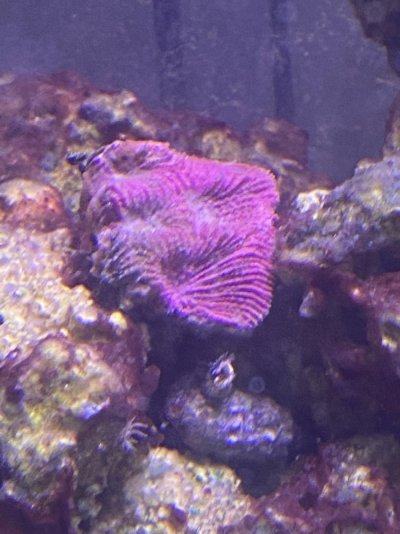
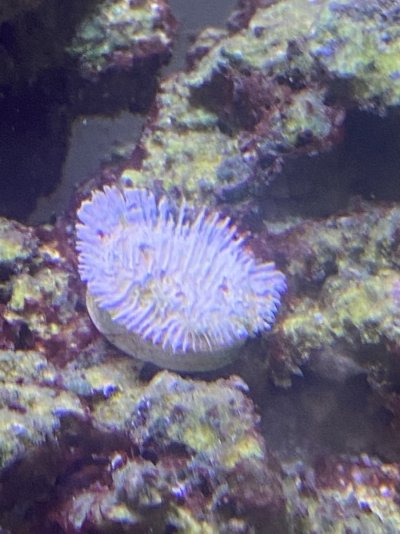
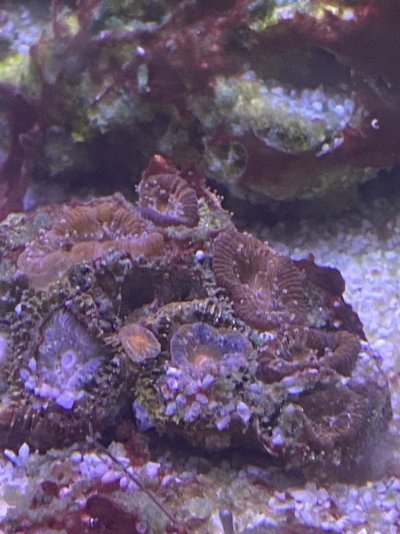
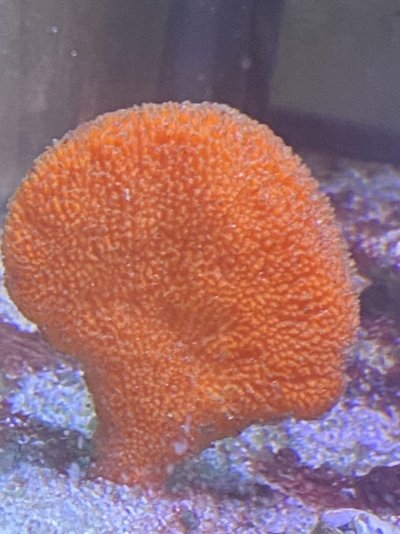
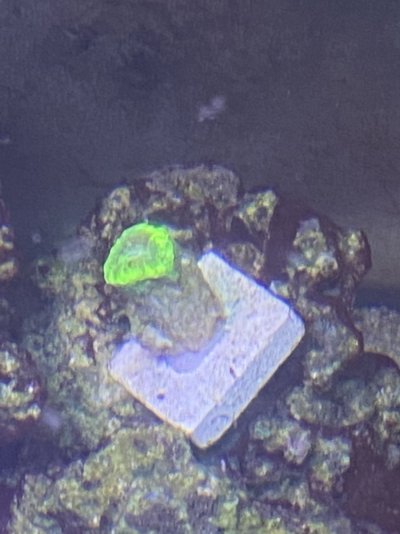
Anyways, I’ve Got the Salinity down to 1.026 now and I’m hoping my corals can make a recovery, is it likely that they will? And would it be worth getting some coral food like reef roids and feeding them to help them recover?
Here are pictures of all of my coral today
Favia, chalice (I think that one is dead), acan, sponge and candy cane





Last edited:
How many threads on this exact same topic from the same OP?
Emma_fish, you must be on information overload at this point. May I suggest you let all other threads die out and only keep 1 going on this topic. It will be less confusing for you and you will get a clearer path on how to proceed.
Just don't respond to the other threads and they will die out.
Emma_fish, you must be on information overload at this point. May I suggest you let all other threads die out and only keep 1 going on this topic. It will be less confusing for you and you will get a clearer path on how to proceed.
Just don't respond to the other threads and they will die out.
Ah ok thanks I didn’t know what to do so I just continued to post on all of them but this would make it easierHow many threads on this exact same topic from the same OP?
Emma_fish, you must be on information overload at this point. May I suggest you let all other threads die out and only keep 1 going on this topic. It will be less confusing for you and you will get a clearer path on how to proceed.
Just don't respond to the other threads and they will die out.
What do you recommend I do about my parameters for the best as Alk is low, Calcium is high and Ph is fine. I don’t want to go messing about with things and making things unstable but I also don’t want my corals to not be able to recover/suffer because my parameters aren’t correct
Alk: 5.4
Calcium: over 500
Ph: 8.3
Alk: 5.4
Calcium: over 500
Ph: 8.3
It's really hard for alk to get below 6.
Can you re-test? Make sure you follow the direction on the box.
Calcium will fall on its own. (or with water changes)
Can you re-test? Make sure you follow the direction on the box.
Calcium will fall on its own. (or with water changes)
Retested Alk (so glad that I did)It's really hard for alk to get below 6.
Can you re-test? Make sure you follow the direction on the box.
Calcium will fall on its own. (or with water changes)
1st time: 10.9 (I believe I did something wrong when testing this time so I tried again)
2nd time: 7
3rd time:7
Again, I think you’re misunderstanding the point, transferring coral from one tank to another is stressful, drip acclimating does not lessen that stress and may in fact add to it. A coral is not able to properly respirate in a bag or container of water that doesn’t have adequate flow, try keeping a coral in a tank that has good water chemistry and lighting but no flow and let me know how it works out. I don’t have a source for the rate at which corals ‘regulate their internal state’, that’s not really something there’s an objective answer to, there are too many variables to give any sort of definitive answer. But I have read many studies about coral respiration, coral physiology, and how corals intake nutrients and expel the byproducts of photosynthesis. I’ve also seen with my own eyes how long it takes a coral that has been kept in dyed water to fully expel the colored water when put into non-dyed water. No coral vendor or professional that I know of drip acclimates their corals when they get a new shipment, they just put them directly into the tank.Source for the rate at which corals regulate their internal state? I know how diffusion works lol. Also, corals can respirate while dripping. It isn't stagnant water. Still though, unless yoy can find some link to a paper on dripping does nothing for corals, I'm going to assume that, like every coral vendor, coral chem companies, and 99% of people on here say, it is likely that there is stress when rapidly changes the environment of the coral. I agree though that this would work well on another thread (sorry op lol). If you'd like, I'd be happy to continue the discussion
Here’s an article where both Julien Sprung and Jake Adams talk about how drip acclimation is unnecessary and how it’s more important to get the coral into flowing water:
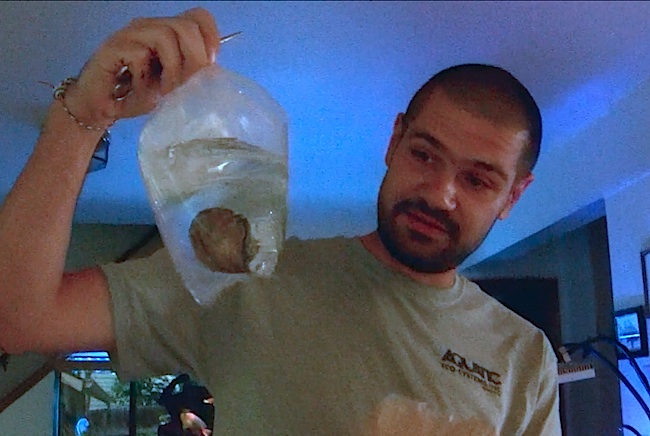
Acclimating corals, how most home hobbyists should do it (video) | Reef Builders | The Reef and Saltwater Aquarium Blog
Imagine that you are just stepping off a long inter-continental flight. As you step off you are walked through a long hallway with air that has a smooth gradient of temperature and pressure to…
reefbuilders.com
I have been floating, dip, and dunk for years now. No problems at all.Again, I think you’re misunderstanding the point, transferring coral from one tank to another is stressful, drip acclimating does not lessen that stress and may in fact add to it. A coral is not able to properly respirate in a bag or container of water that doesn’t have adequate flow, try keeping a coral in a tank that has good water chemistry and lighting but no flow and let me know how it works out. I don’t have a source for the rate at which corals ‘regulate their internal state’, that’s not really something there’s an objective answer to, there are too many variables to give any sort of definitive answer. But I have read many studies about coral respiration, coral physiology, and how corals intake nutrients and expel the byproducts of photosynthesis. I’ve also seen with my own eyes how long it takes a coral that has been kept in dyed water to fully expel the colored water when put into non-dyed water. No coral vendor or professional that I know of drip acclimates their corals when they get a new shipment, they just put them directly into the tank.
Here’s an article where both Julien Sprung and Jake Adams talk about how drip acclimation is unnecessary and how it’s more important to get the coral into flowing water:

Acclimating corals, how most home hobbyists should do it (video) | Reef Builders | The Reef and Saltwater Aquarium Blog
Imagine that you are just stepping off a long inter-continental flight. As you step off you are walked through a long hallway with air that has a smooth gradient of temperature and pressure to…reefbuilders.com
The chalice and favia are dead. Acan still looks really rough. This is what a healthy acan should look like. Definitely get a refractometer ($30-40). Alk at 7 is fine. Just keep it there.

Right ok I will just leave everything as it is then and wait for things to get betterThe chalice and favia are dead. Acan still looks really rough. This is what a healthy acan should look like. Definitely get a refractometer ($30-40). Alk at 7 is fine. Just keep it there.
It seems Patience is the key a lot of the time in this hobby
- Joined
- Aug 8, 2021
- Messages
- 744
- Reaction score
- 888
No paper but ask any coral vendor how they acclimate their corals when they get a shipment. They toss them straight into the dip then right into the tank. That means they probably get 10-20 mins of “acclimation” to the new water before going in the tank. They don’t drip either. Could you imagine how much space and resources it would take to drip acclimate 50 boxes of coral for example? It does seem corals self regulate their acclimation process.Source for the rate at which corals regulate their internal state? I know how diffusion works lol. Also, corals can respirate while dripping. It isn't stagnant water. Still though, unless yoy can find some link to a paper on dripping does nothing for corals, I'm going to assume that, like every coral vendor, coral chem companies, and 99% of people on here say, it is likely that there is stress when rapidly changes the environment of the coral. I agree though that this would work well on another thread (sorry op lol). If you'd like, I'd be happy to continue the discussion
No paper but ask any coral vendor how they acclimate their corals when they get a shipment. They toss them straight into the dip then right into the tank. That means they probably get 10-20 mins of “acclimation” to the new water before going in the tank. They don’t drip either. Could you imagine how much space and resources it would take to drip acclimate 50 boxes of coral for example? It does seem corals self regulate their acclimation process.
Again, no doubt that they self regulate, but until I can see something substantial supporting no drip, I just can't agree that dripping is bad or a waste of time between tanks of dramatically different parameters. It goes against 99% of advice when dosing) and changing parametersAlso, as I stated before, I don't want to hijack this thread so I'd rather move this to another thread if you want to continue.
Similar threads
- Replies
- 11
- Views
- 196
- Replies
- 14
- Views
- 208
- Replies
- 6
- Views
- 267






